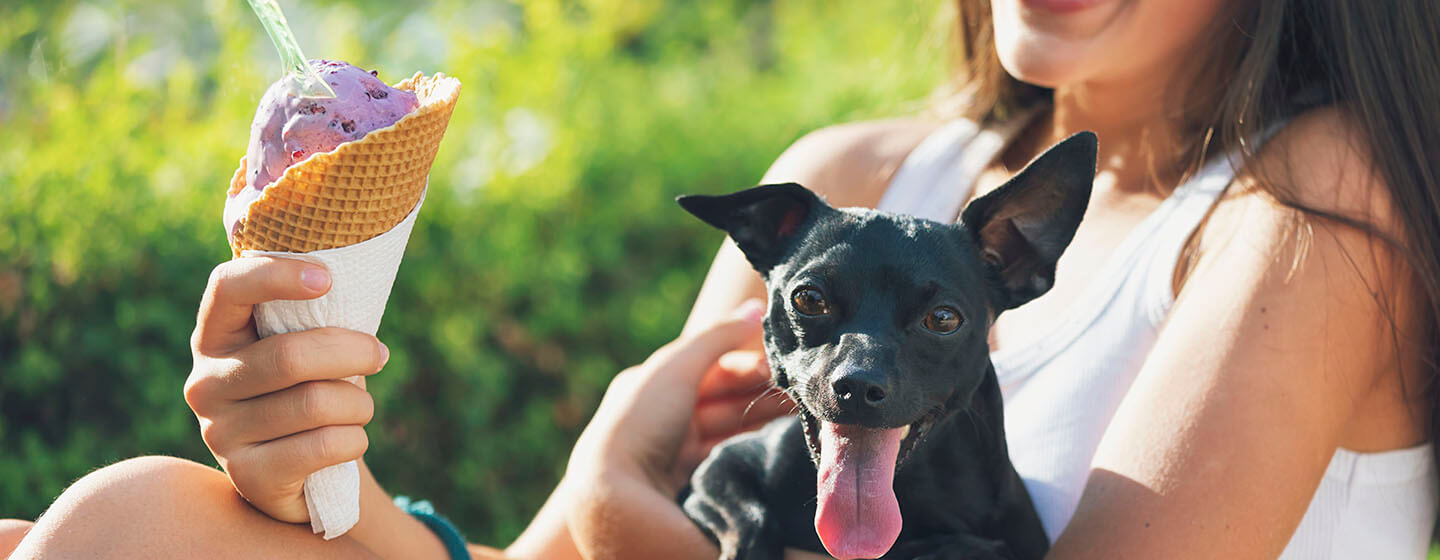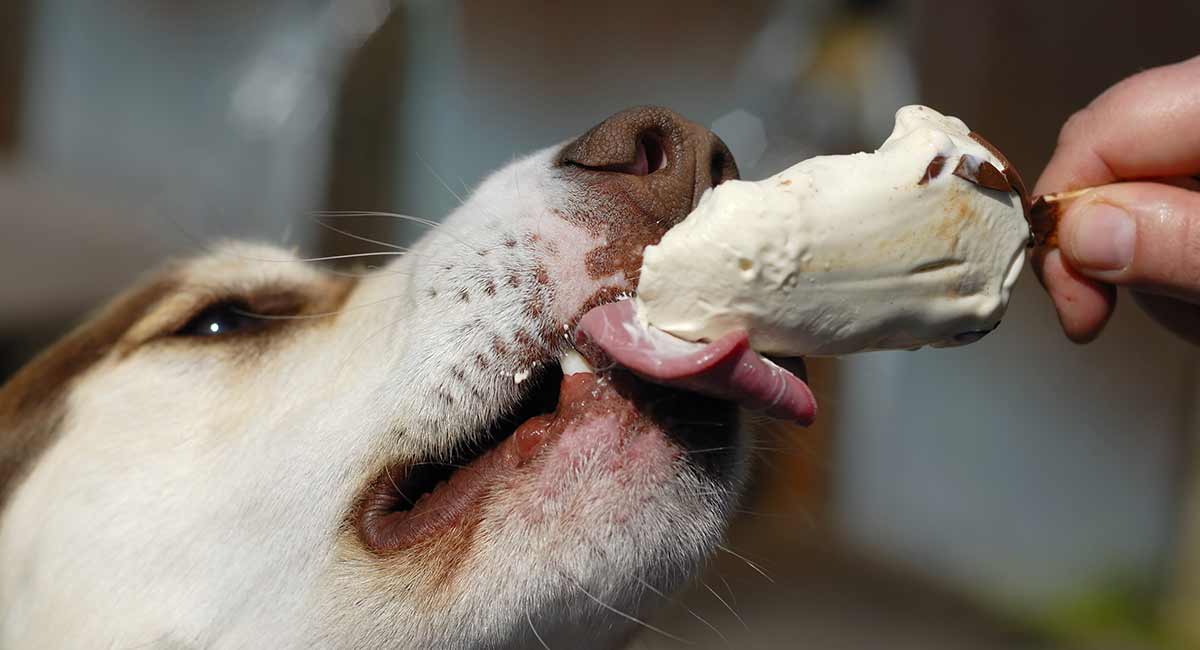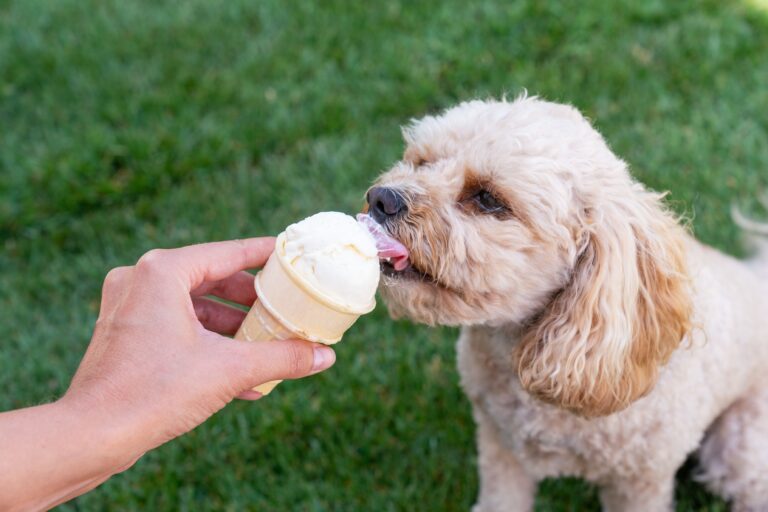If your dog ate ice cream, monitor for any adverse reactions and contact your veterinarian for advice. Having a beloved pet consume a food item they shouldn’t can be a cause for concern.
Ice cream can pose potential health risks for dogs due to the high sugar and dairy content. This can result in gastrointestinal upset, including diarrhea, and even more severe symptoms such as pancreatitis or obesity. It’s essential to be proactive and observe your dog for any signs of discomfort or illness.
In some cases, immediate veterinary attention may be necessary. Additionally, it’s crucial to be mindful of the ingredients in the ice cream, as certain additives like chocolate or xylitol can be toxic to dogs. As a responsible pet owner, staying informed about potential hazards and seeking prompt medical advice is key in ensuring your dog’s well-being.

Credit: www.purina.co.uk
Signs Of Ice Cream Ingestion In Dogs
If your dog has ingested ice cream, watch out for signs such as stomach upset, diarrhea, and vomiting. It’s important to consult your veterinarian for guidance on what to do next.
Digestive Symptoms
If your furry friend has managed to sneak a taste of your delicious ice cream, it’s essential to keep a close eye on them for any signs of discomfort or digestive issues. Dogs have sensitive stomachs, and consuming ice cream can lead to various digestive symptoms. Look out for the following signs:1. Diarrhea: Keep an eye on your dog’s bowel movements. If you notice loose stools or increased frequency, it may indicate that the ice cream didn’t sit well with their stomach. 2. Vomiting: Dogs may experience episodes of vomiting after ingesting ice cream. If your pet starts retching or regurgitating, it could be a sign of an upset stomach. 3. Abdominal pain: Watch your dog for any signs of discomfort in their tummy. If they seem to be excessively licking or biting their belly or if they display restlessness and reluctance to lie down, it could be an indication of abdominal pain.Allergic Reaction Symptoms
Just like humans, dogs can also be allergic to certain ingredients found in ice cream. If your dog is showing any allergic reaction symptoms after consuming ice cream, it’s important to seek veterinary assistance right away. Look out for the following signs of an allergic reaction:1. Itching and scratching: If your dog starts excessively scratching, biting, or licking their body, it could indicate an allergic response to the ice cream. 2. Swelling: Check your dog’s face, lips, or tongue for any swelling, which may be a sign of an allergic reaction. This swelling can be mild or severe, so it’s crucial to monitor it closely. 3. Hives or rashes: Keep an eye out for red bumps or raised welts on your dog’s skin. These hives or rashes could indicate an allergic response to the ice cream.Toxic Ingredient Symptoms
Certain ingredients commonly found in ice cream can be toxic to dogs. If your furry companion has ingested ice cream containing these harmful substances, you must be vigilant for any symptoms of toxicity. Look for the following signs:1. Chocolate poisoning: Chocolates are toxic to dogs. If the ice cream had chocolate as an ingredient, keep an eye out for symptoms such as increased heart rate, restlessness, vomiting, diarrhea, or even seizures. 2. Xylitol toxicity: Some sugar-free ice creams contain xylitol, which is extremely toxic to dogs. If your pet starts experiencing symptoms like weakness, vomiting, seizures, or difficulty walking after consuming such ice cream, seek immediate veterinary attention. Remember, each dog is unique, and their reactions may vary. If you notice any of the mentioned symptoms or any other signs that concern you after your dog has eaten ice cream, it is always best to consult with a veterinarian for appropriate advice and guidance. Keep your furry friend safe and healthy by being aware and proactive about their dietary choices.Immediate Steps To Take
When your dog eats ice cream, it can be a cause for concern. Immediate action is necessary to ensure the well-being of your furry friend.
Assess The Situation
Start by assessing the situation. Determine the quantity and type of ice cream your dog consumed. Take note of any unusual behavior or symptoms displayed.
Contact A Veterinarian
Get in touch with your veterinarian immediately. Describe the situation in detail and follow their instructions. They will provide the best course of action based on the specific circumstances.
Monitor Your Dog
Closely monitor your dog for any signs of distress or discomfort. Keep an eye out for symptoms such as vomiting, diarrhea, or unusual lethargy. Immediate veterinary attention may be required if any concerning symptoms arise.
Offer water and bland food to your dog. Ensure they stay well-hydrated and their stomach is not left empty. However, avoid offering any more dairy products or rich, fatty foods. Stick to a simple, easily digestible diet to aid in the recovery process.
Potential Dangers Of Ice Cream For Dogs
When it comes to sharing ice cream with your dog, it’s essential to be aware of the potential dangers that this sweet treat can pose to your furry friend. While it may be tempting to indulge your pup with a lick of your ice cream cone, there are several factors to consider, including lactose intolerance, artificial sweeteners, additives, flavors, and chocolate ice cream. Let’s take a closer look at these potential hazards and how they can affect your dog’s health.
Lactose Intolerance
Dogs, like some humans, can be lactose intolerant, meaning they have difficulty digesting lactose, a sugar found in milk. Ice cream contains dairy, which can lead to digestive upset, including diarrhea, gas, and stomach discomfort in lactose-intolerant dogs.
Artificial Sweeteners
Some ice creams are sweetened with artificial sweeteners such as xylitol, a substance toxic to dogs. Even a small amount of xylitol can cause a rapid release of insulin in dogs, leading to a dangerous drop in blood sugar levels and potentially resulting in seizures, liver failure, and even death.
Additives And Flavors
Ice cream often contains various artificial additives and flavors that may not be safe for canine consumption. These ingredients can cause allergic reactions, gastrointestinal issues, and other adverse effects in dogs, making it important to be cautious about offering them ice cream.
Chocolate Ice Cream
Chocolate, a common ice cream flavor, contains theobromine and caffeine, both of which are toxic to dogs. Ingestion of chocolate ice cream can lead to symptoms such as vomiting, diarrhea, rapid breathing, increased heart rate, and seizures, which can be life-threatening if not promptly addressed by a veterinarian.
Preventing Ice Cream Ingestion In Dogs
Ice cream is a delicious treat that many humans enjoy, but did you know that it can be harmful to your furry friends? While it may be tempting to share a bite of your ice cream cone with your dog on a hot summer day, it’s important to remember that certain ingredients in ice cream can be toxic to dogs. To ensure your dog stays safe and healthy, here are some important steps you can take to prevent ice cream ingestion.
Avoid Sharing
While it’s natural to want to share the joy of eating ice cream with your dog, it’s best to avoid sharing this indulgent dessert altogether. Keep in mind that many ice creams contain ingredients that are unsafe for dogs, like chocolate, artificial sweeteners, and high levels of sugar. These ingredients can lead to upset stomachs, digestive issues, dental problems, and even more serious health complications. Instead of sharing your ice cream, treat your dog to something specifically made for them, like dog-friendly frozen treats or frozen fruits like strawberries or watermelon.
Offer Suitable Alternatives
If you’re looking for a way to keep your dog cool and content during the summer months, consider offering them some alternative icy treats. There are plenty of dog-friendly frozen desserts available that are specifically formulated to be safe for dogs to consume. Look for options that are made with natural, wholesome ingredients and without any harmful additives. You can also try freezing some low-sodium chicken or beef broth in ice cube trays for a refreshing and tasty snack that your dog is sure to enjoy.
Educate Friends And Family
When it comes to preventing ice cream ingestion in dogs, it’s not just your own actions that matter. It’s important to also educate your friends and family members about the potential hazards of giving ice cream to your dog. Many well-meaning individuals may not be aware of the dangers and may inadvertently offer your dog a bite. Take the time to explain why it’s important to keep ice cream away from your dog and suggest alternative treats that are safe for them. By spreading awareness, you can help ensure the well-being of not only your own dog but other dogs in your community as well.
Secure Trash And Leftovers
Aside from preventing direct ingestion of ice cream, it’s also crucial to keep your dog away from leftover ice cream containers, wrappers, and any other related trash. Dogs are known for their scavenging tendencies, and they may be tempted to raid the trash and eat anything that smells or tastes good. Make sure you properly secure and dispose of any leftovers or trash containing ice cream to avoid any accidental ingestion or choking hazards. Keep trash cans in secure locations or use dog-proof containers, and regularly clean up any spills or crumbs to minimize the risk of your dog coming into contact with ice cream or its packaging.
Other Common Food Hazards For Dogs
If your dog has eaten ice cream, it is important to be aware of other common food hazards for dogs. Take action by contacting your veterinarian immediately and monitoring your dog for any signs of illness or discomfort. Keep potentially harmful foods out of your dog’s reach to prevent further incidents.
No matter how vigilant we are as dog owners, accidents happen. Our furry friends may occasionally get their paws on food that is harmful to them. It’s important to be aware of these potential dangers to ensure the well-being of our beloved pets. Here are a few other common food hazards for dogs:
Chocolate
Chocolate may be a delectable treat for humans, but it’s a big no-no for dogs. Theobromine, a substance present in chocolate, can cause various health issues in our four-legged companions. These can range from digestive upset and increased heart rate to more severe symptoms like seizures and even death. It’s essential to keep chocolate and any products containing it out of your dog’s reach, as even small amounts can be dangerous.
Grapes And Raisins
While many fruits are safe for dogs, grapes and raisins can be toxic and lead to kidney damage. The exact reason behind their toxicity is still unknown, but it’s best to err on the side of caution and avoid giving your dog these fruits altogether. Be mindful of desserts, trail mixes, and even some types of bread that may contain raisins.
Onions And Garlic
Onions and garlic, whether raw, cooked, or in powder form, should be kept away from our canine companions. These common ingredients in many dishes can cause damage to a dog’s red blood cells, leading to anemia. Symptoms of onion or garlic toxicity may not appear immediately, so it’s important to seek veterinary attention if your dog has ingested them.
Xylitol
Xylitol is a sweetener often found in sugar-free products like gum, candy, and some baked goods. While it may be safe for humans, it is highly toxic to dogs. Ingesting even a small amount of xylitol can cause a rapid release of insulin in a dog’s body, leading to decreased blood sugar levels. This can result in symptoms such as vomiting, loss of coordination, seizures, and, in severe cases, liver failure. Keep all xylitol-containing products securely stored where your dog cannot access them.
Being aware of these common food hazards can help you protect your furry friend from unnecessary health issues. Remember to promptly get in touch with your veterinarian if you suspect your dog has ingested any harmful foods. Prevention is always better than cure, so keep these hazardous items out of reach and ensure the happiness and well-being of your canine companion.

Credit: dogsnet.com

Credit: www.vets-now.com
Frequently Asked Questions For What Do I Do If My Dog Ate Ice Cream
Can Dogs Eat Ice Cream?
Yes, dogs can eat ice cream, but it’s not recommended. Ice cream contains lactose and sugar which can upset a dog’s stomach and lead to digestive issues. It’s better to give your dog frozen treats specifically made for dogs instead.
What Should I Do If My Dog Ate Ice Cream?
If your dog ate ice cream, monitor them for any signs of stomach upset or diarrhea. Provide plenty of water to keep them hydrated. If any symptoms persist or worsen, consult your veterinarian for further guidance. It’s always best to keep human treats and foods out of a dog’s reach.
Can Dogs Have Vanilla Ice Cream?
While a small amount of plain, vanilla ice cream likely won’t harm your dog, it can still cause stomach discomfort due to the lactose and sugar content. It’s safer to opt for dog-safe frozen treats or make homemade frozen treats using ingredients that are safe for dogs.
Conclusion
If your dog ate ice cream, it’s important to take action to ensure their safety and well-being. Remember to stay calm and assess the situation. Monitor your dog for any signs of discomfort or illness. Contact your veterinarian for advice on what steps to take next.
In the future, be mindful of what foods you give your dog to prevent potential hazards. Your furry friend’s health is a top priority, and being proactive is key to keeping them happy and healthy.



